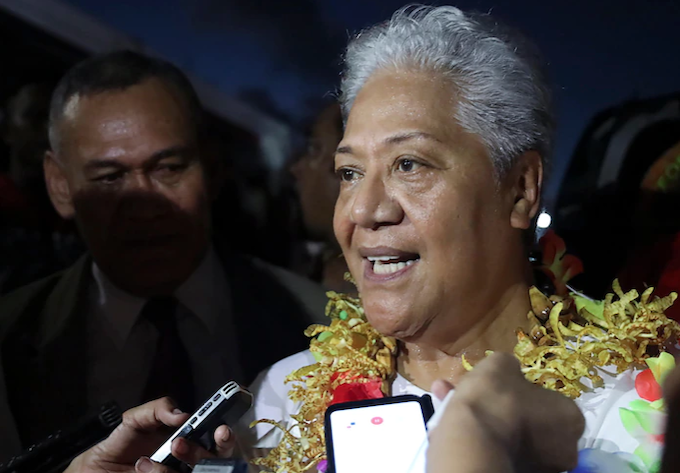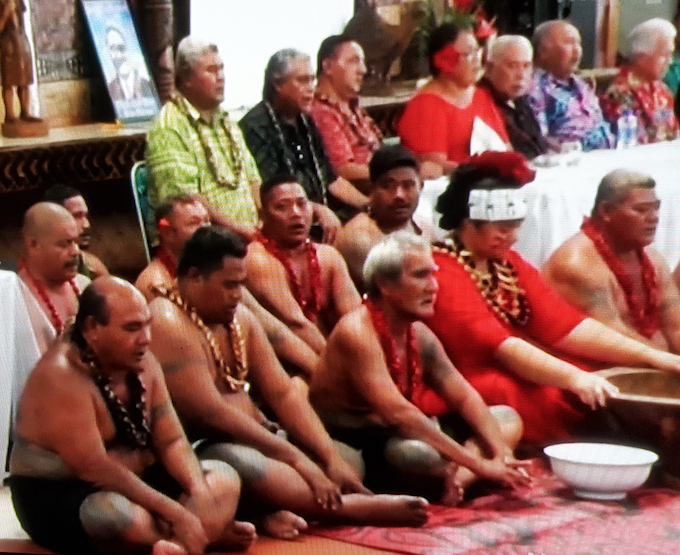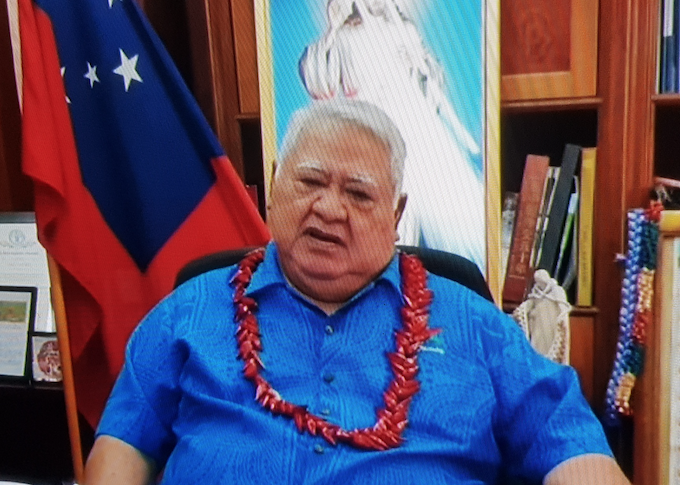
ANALYSIS: By Patricia A. O’Brien, Georgetown University
New battlelines in Samoa’s ongoing political crisis were drawn this week. After an evening swearing-in ceremony on the lawn of Parliament house, Samoa now has two governments claiming a mandate to rule.
What comes next will have vast ramifications for the Pacific nation, its region and for democracy globally.
On Monday, May 24, Fa’atuatua I Le Atua Samoa Ua Tasi (FAST) Party members, led by Fiame Naomi Mata’afa, arrived at Parliament house to be sworn into office following their one-seat election win on April 9.
- READ MORE: Despite a veneer of democracy, Samoa is sliding into autocracy
- Samoa’s stunning election result: on the verge of a new ruling party for the first time in 40 years
- Samoa incumbent leader needs to ‘get a grip’, says PM-elect Fiame
- FAST heading back to court to try and resolve political impasse in Samoa
- Other Samoan political crisis reports on Asia Pacific Report
- RNZ’s live updates
- The Pacific Newsroom’s updates
- The Samoa Observer editorial today – Swearing-in strengthens nation’s foundation
They found the doors locked by order of Tuila’epa Sa’ilele Malielegaoi, who has been prime minister for the last 23 years. By late afternoon, with the building still locked, the marquee swearing-in ceremony took place outside.
This was the 45th day since the election, the last date on which the newly elected parliament could sit according to Samoa’s constitution.
A constitutional arm wrestle
The unprecedented delay was due to a series of extraordinary maneuvres aimed at keeping Tuila’epa’s Human Rights Protection Party (HRPP) in power after losing its first election in 40 years.
By forcing the clock to run out on the 45-day limit for a new Parliament to convene, the HRPP would propel Samoa into uncharted constitutional waters, providing justification for another election.
The Head of State, Tuimaleali’ifano Va’aleto’a Sualauvi, had declared the April 9 election results void and that a second election be held May 21. On May 17, the Supreme Court deemed that declaration illegal, upholding FAST as the victors of the vote and ordering parliament to convene on May 24.
Then, on May 22, the Head of State abruptly announced Parliament was suspended until further notice. Fiame described this latest development as a “coup”.
In response, the Supreme Court held an urgent hearing on May 23. It again overruled the Head of State and ordered Parliament to sit on May 24.

Court and church lend legitimacy
The makeshift swearing-in ceremony gave Prime Minister-elect Fiame’s government legitimacy. The presence of the revered former Head of State, Tui Atua Tupua Tamasese Ta’isi Efi, aided the optics. The current Head of State, who has shocked many with his actions, was said to have left the capital, Apia, for a distant village.
Also legitimising the Fiame government’s swearing-in was the chairman of the Congregational Christian Church, Reverend Elder Iosefa Atapana Uilelea, who led the opening prayers. Until that point, the immense moral force of church leadership had not been activated to support either side.
Tuila’epa’s response at Monday night’s press conference was in character: FAST had been overtaken by “the devil”, had “mental issues needing professional help” and were akin to “the Mafia”.

More ominous was his accusing FAST of “stealing” his authority and “treason”.
Tuila’epa’s strategy to retain power has relied on an interpretation of powers of the head of state that have no basis in law or precedent. When these moves have been blocked by the Supreme Court, he has denounced it as illegitimate and ignored its decisions.
By contrast, Fiame (who was Tuila’epa’s deputy until late 2020) and her FAST members have exhibited professionalism, restraint, and faith in Samoa’s constitution, courts and the people who put them in power.
Now, new battlelines will be drawn over which government is the legitimate one and who adjudicates that critical point. This will entail more direct confrontation between the Head of State and Supreme Court, which will extend the deadlock.
How will the crisis be resolved?
Without a military, Samoa cannot resolve its crisis like neighbouring Fiji, where the army has staged multiple coups since 1987. In Samoa, the police occupy a pivotal role, but to date have acted peacefully and in accordance with the courts.
But since May 17, another factor has come into play. Samoa has attracted regional and world attention because Fiame is the first female leader of the country, and one of few in the region.
Since May 22, the world has watched Tuila’epa’s attempts to deny her power with great interest.
Samoa is a microcosm of US President Joe Biden’s recent description of the struggles between democracy and the autocratic political regimes favoured by Chinese President Xi Jinping. Samoa moved closer to China under Tuila’epa but that may now be reversed under Fiame.
So far, New Zealand’s prime minister, Jacinda Ardern, and Australia’s foreign minister, Marise Payne, have made cautious statements about their faith in Samoa’s democratic institutions.
In the coming days, New Zealand and Australia, the US, Japan, Britain, the European Union and the main regional body, the Pacific Islands Forum, must actively support Samoa’s democratically elected government in any way requested by Fiame.
Supportive words may soon be inadequate as Tuila’epa makes his next moves in what looks now like a naked power grab.![]()
Dr Patricia A. O’Brien is visiting fellow at the School of History, Australian National University, and adjunct professor, Asian Studies Programme, Georgetown University. This article is republished from The Conversation under a Creative Commons licence. Read the original article.










































